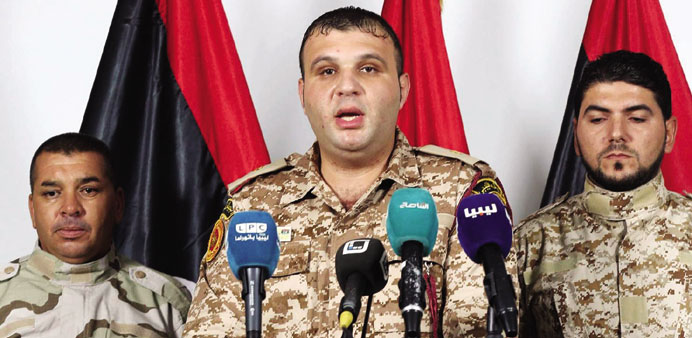Mohamed Abdul Kafi, first lieutenant and spokesman for the Libyan ministry of defence, speaks during a press conference in Tripoli yesterday.
AFP/Tripoli
A helicopter from Libya’s Tripoli-based government was shot down yesterday, killing at least nine passengers, an official said, blaming the rival, internationally recognised administration which denied the accusation.
The aircraft, carrying 16 people, was hit shortly before noon and crashed into the sea near Al Maya, just west of Tripoli, said Colonel Mustafa Sharkasi, a spokesman for the Tripoli-based air force.
“We have so far recovered nine bodies, including the body of Colonel Hussein Abu Diyya,” a senior officer in the Fajr Libya militia that controls the capital.
“We think that all the passengers are dead,” he added.
Sharkasi said the aircraft was unarmed and blamed militant groups allied to the internationally recognised government for carrying out this “criminal” act.
That administration, located in the east of the country, denied it had anything to do with the aircraft’s downing.
“The general command of the armed forces is brave enough to claim the operations that its units carry out anywhere in the country,” spokesman Khalifa el-Obeidi told the official news agency.
Sharkasi vowed that Tripoli would retaliate “at the appropriate time and place”.
And the Tripoli defence ministry declared a “maximum state of alert for the armed forces and thuwars (former rebel fighters) with a view to eventual retaliation”.
It called on citizens to “provide any information that can help to identify those who fired on the aircraft”.
Sharkasi said the helicopter was on its way to Tripoli from an unspecified location when it was hit.
In addition to Abu Diyya, three crew members and “employees, including bank employees who were carrying funds for state employees” were on board.
Libya descended into chaos after the October 2011 ouster and killing of longtime dictator Muammar Gaddafi.
The two governments are vying for power, and armed groups are battling for control of its vast energy resources.
The capital was overrun in August 2014 by the Fajr Libya militia alliance which included Islamists.
The militia later established a rival government and a parliament that forced the internationally recognised administration to flee to the country’s remote east.
The United Nations has been brokering peace talks between the two sides for nearly a year, aimed at forming a government of national unity.
Those talks have virtually broken down this month, but UN envoy Bernardino Leon said last Wednesday that the process would carry on.

